While there's an increasing trend of utilizing natural resources for health and wellness benefits, it's essential to approach this avenue with a well-informed mind. In the vast world of natural supplements, Cordyceps—a fungus known for its potential health-enhancing properties—has gained significant popularity. However, as with any supplement, it's crucial to understand its benefits and potential risks.
While known for their potential health benefits, Cordyceps also have potential dangers that must be considered. The most prominent risks include immune system implications, as Cordyceps could overstimulate the immune system and exacerbate auto-immune diseases. They may also interact with certain medications, particularly those for diabetes and auto-immune diseases.
Cordyceps can slow blood clotting, posing a risk for individuals with bleeding disorders or those about to undergo surgery. Overconsumption could lead to side effects like diarrhea, dry mouth, and nausea. As with any supplement, there is also the risk of allergic reactions. Lastly, the unregulated market for Cordyceps can result in the consumption of low-quality, contaminated, or mislabeled products.
Given these potential dangers, it becomes evident why professional guidance is indispensable when incorporating such supplements into your routine. This article will dive deeper into the risks associated with Cordyceps, backed by existing research and expert opinions, to help you make a safe and informed decision.
Understanding Cordyceps

Unraveling the Mysteries of Cordyceps
Cordyceps are a fascinating group of fungi with over 400 species, the most famous of which are Cordyceps Sinensis and Cordyceps Militaris. Cordyceps Sinensis, also known as the "caterpillar fungus," is native to the high-altitude regions of China, Nepal, and Tibet.
The term "caterpillar fungus" refers to the unique life cycle of Cordyceps Sinensis. In its wild form, it parasitizes caterpillars, eventually producing a fruiting body from the host's head, hence the name.
Cordyceps Militaris, another well-known member of the Cordyceps family, is also valued for its potential medicinal properties. Unlike Cordyceps Sinensis, Cordyceps Militaris can be easily cultivated, making it a more sustainable and accessible option for cordyceps supplements.
Cordyceps in Traditional Chinese Medicine
The use of Cordyceps Sinensis in traditional Chinese medicine dates back centuries. It was considered a powerful tonic and a traditional treatment for various ailments.
The mushroom's rarity and beneficial properties made it highly prized. Today, Cordyceps Militaris, due to its accessibility, has also been incorporated into the repertoire of traditional Chinese medicine.
The Science Behind Cordyceps Mushrooms
Cordyceps Sinensis and Cordyceps Militaris have been studied for their potential health benefits. These cordyceps mushrooms contain various bioactive compounds like cordycepin, adenosine, and polysaccharides, which are believed to contribute to their medicinal properties.
Scientifically, Cordyceps Sinensis—or Ophiocordyceps Sinensis—has been researched for its potential immune-boosting and anti-fatigue properties. Cordyceps' ability to boost energy and its traditional uses have made it a popular choice in cordyceps supplements.
Cordyceps Militaris, on the other hand, has garnered attention for its potential antioxidant and anti-inflammatory benefits. Its easily cultivable nature has also made it a common constituent of cordyceps supplements.
The Role of Cordyceps in Modern Health Practices
Despite their ancient roots in traditional Chinese medicine, cordyceps mushrooms, specifically Cordyceps Sinensis and Cordyceps Militaris, have found their way into modern health and wellness practices. They're often marketed as a "medicinal mushroom," with Cordyceps Sinensis and Cordyceps Militaris featuring prominently in many cordyceps supplements.
The Popularity of Cordyceps
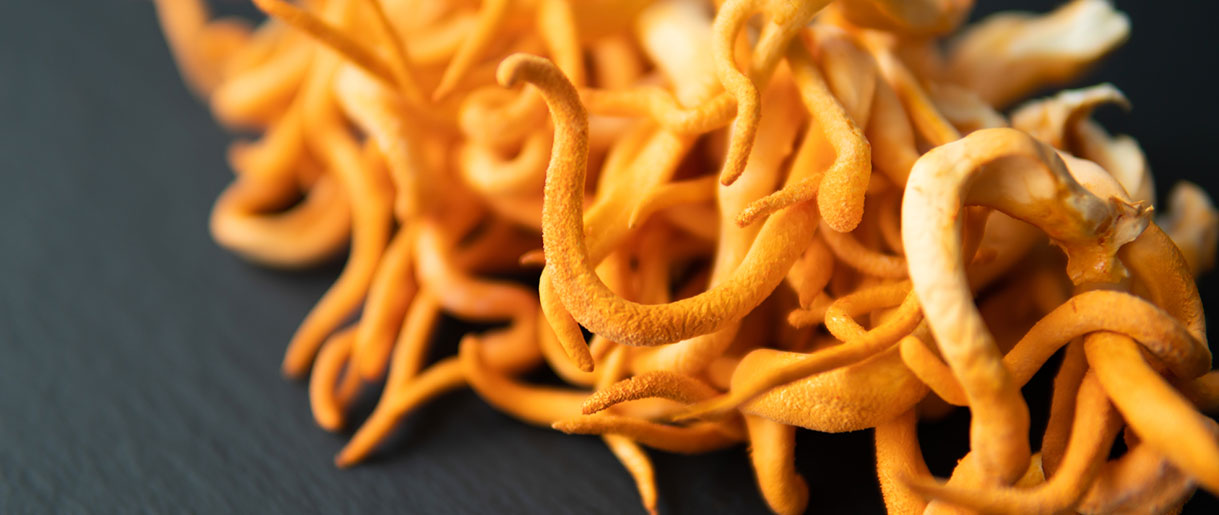
The Surge in Cordyceps Popularity: A Modern Wellness Trend
For several reasons, cordyceps mushrooms have been gaining popularity in modern health and wellness trends. With their rich history in traditional medicine, these unique fungi are now recognized for their potential health-enhancing properties.
Studies suggest(1) that Cordyceps can treat diabetes, and help manage blood sugar levels, potentially benefiting those with chronic kidney disease. Their potential anti-aging benefits and ability to fight inflammation have also drawn considerable interest.
Cordyceps in Sports Nutrition and Performance
The use of Cordyceps mushrooms has become particularly prevalent in sports nutrition, owing to their ability to improve exercise performance. Some research(2) suggests that Cordyceps can boost testosterone production, an essential hormone for athletic performance. This increase in testosterone production is thought to enhance energy levels, endurance, and overall exercise performance.
Cordyceps for Immune Support and Beyond
Beyond sports nutrition, Cordyceps mushrooms have been hailed for their potential immune-boosting properties. Some studies suggest that(3) they may promote the activity of white blood cells, which are crucial immune cells in the body's defense against illness and disease.
There's also interest in their potential application in cancer treatments, particularly for lung cancer. This interest stems from research suggesting that(4) the natural Cordyceps Sinensis could have anti-tumor properties.
The Dangers of Cordyceps
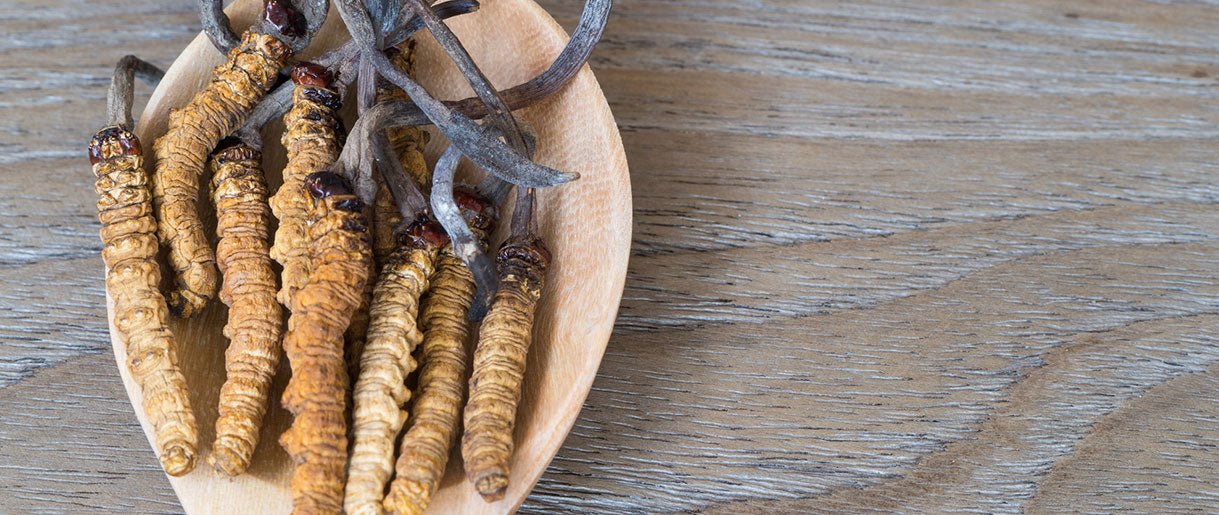
Understanding Cordyceps Dangers: More Than Meets the Eye
As with any supplement, taking Cordyceps has its share of potential dangers. Despite the purported benefits, weighing these against the possible adverse effects is essential.
The risks range from immune system implications and drug interactions to impact on blood clotting and concerns around overconsumption. Even allergies, sensitivities, and the potential for consuming low-quality products due to an unregulated market all contribute to the dangers one must consider.
Immune System Implications and Cordyceps
While potentially beneficial to the immune system, Cordyceps mushrooms may present a risk for individuals with auto-immune diseases. By potentially boosting the immune system, taking Cordyceps might exacerbate symptoms in people with lupus, rheumatoid arthritis, and multiple sclerosis. This concern also extends to renal transplant patients, where an overactive immune response could lead to organ rejection.
The Risk of Drug Interactions
One of the significant cordyceps dangers comes from potential drug interactions. People taking blood thinners or diabetes medications should be particularly cautious. Cordyceps may slow blood clotting and lower blood sugar levels, potentially increasing the effectiveness of blood thinning medication and leading to excessive blood thinning or hypoglycemia.
Cordyceps and Blood Clotting
The inhibitory effects of Cordyceps on blood clotting may pose a risk for individuals with bleeding disorders or those about to undergo surgery. By slowing blood clotting, taking Cordyceps could increase the risk of bleeding and blood clots in these individuals. This critical consideration underscores the need for professional medical advice before starting on Cordyceps.
The Danger of Overconsumption
Taking Cordyceps beyond the recommended levels can lead to health problems. While human research is ongoing, overconsumption of Cordyceps could lead to gastrointestinal distress and other side effects. Pregnant women, in particular, should avoid taking Cordyceps due to a lack of adequate safety data.
Allergies, Sensitivities, and Cordyceps
Allergic reactions and sensitivities to Cordyceps mushrooms can occur, adding to the cordyceps dangers. Individuals may experience symptoms like nausea, dry mouth, and diarrhea.
The Perils of an Unregulated Market
Given the popularity of Cordyceps as an alternative medicine, the market for these supplements has grown exponentially. However, the lack of regulation can lead to the risk of consuming low-quality, contaminated, or mislabeled products. It's essential to consult with health care professionals and source cordyceps from reputable sellers.
Existing Research on Cordyceps Dangers

Various studies have explored the potential dangers of cordyceps mushroom consumption, and the results have provided a better understanding of the potential risks involved.
Some research indicates that(5) the cordyceps extract might enhance the effect of anti-coagulant drugs, acting as a blood thinner, potentially increasing the risk of bleeding in people with bleeding disorders or those on specific medications. Another concern is the potential for hypoglycemia in individuals taking diabetes medication. Cordyceps have shown(6) the potential to lower blood sugar levels, which might interfere with the management of diabetes.
Research also suggests that(7) cordyceps extract might stimulate the immune system. While this may benefit healthy individuals, it could pose a risk for those with auto-immune disorders. The potential over-stimulation of the immune system could exacerbate symptoms of these conditions.
Who Should Avoid Cordyceps
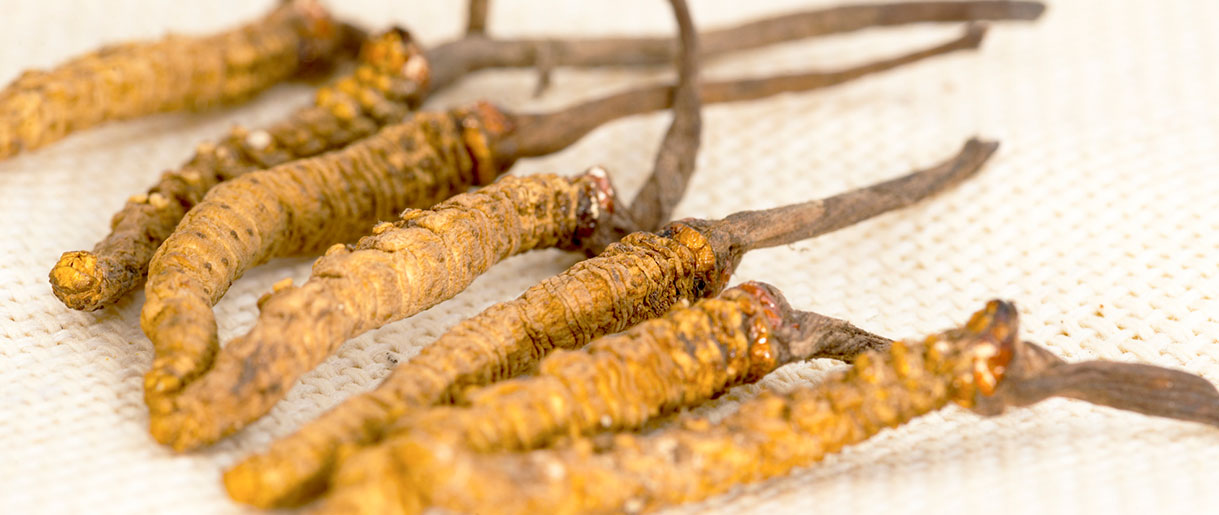
Exercising Caution: Specific Groups and Cordyceps Consumption
Certain individuals should exercise caution or avoid taking Cordyceps altogether due to potential health risks. These include:
Individuals on Blood Thinners
Since Cordyceps can slow blood clotting, people on blood thinners should avoid taking Cordyceps as it may lead to an increased risk of bruising and bleeding. Always consult your healthcare provider before taking Cordyceps, especially if you are on any medications.
People with Renal Insufficiency
Those with renal insufficiency should also be cautious, as Cordyceps might affect kidney function. Consult a healthcare professional for advice, diagnosis, or treatment before considering Cordyceps as a dietary supplement.
Renal Transplant Patients
As Cordyceps might stimulate the immune system, there's a potential risk that they could make the human body more likely to reject a transplanted kidney. Therefore, individuals who have undergone renal transplantation should avoid taking Cordyceps.
Absolute No's: Who Should Avoid Cordyceps Altogether
Some groups should refrain from taking Cordyceps altogether:
Pregnant or Breastfeeding Women
There's insufficient reliable information about the safety of taking Cordyceps when pregnant or breastfeeding. To be on the safe side, it's best to avoid use.
People Scheduled for Surgery
As Cordyceps might affect blood clotting, there's a concern that it might interfere with blood clotting during and after surgery. It's recommended to stop using Cordyceps at least two weeks before a scheduled surgery.
Children
There's limited research on the effects of Cordyceps on children, and for their safety, it's best to avoid use.
Safer Use of Cordyceps

The Role of Healthcare Professionals: Ensuring Safe Supplementation
One of the essential steps in ensuring the safe use of Cordyceps, or any supplement, is to consult with a healthcare professional before starting a new regimen. Healthcare professionals can provide personalized advice based on your specific health needs and conditions, medication interactions, and potential allergies. They can also help monitor your progress and immediately address possible side effects.
Picking the Right Product: Quality Matters
With the growing popularity of Cordyceps, the market has seen an influx of products, not all of which are of high quality. Here are some tips for choosing high-quality Cordyceps products:
Choose Reputable Brands
Stick to brands with a solid reputation for quality and purity. Reputable brands usually provide evidence of third-party testing, ensuring their products are contaminant-free.
Read Labels Carefully
Ensure the product label clearly states the species of Cordyceps used (usually Cordyceps Sinensis or Cordyceps Militaris). The label should also indicate the amount of Cordyceps present in each serving.
Beware of Unrealistic Claims
Be skeptical of products making grandiose health claims. High-quality brands usually present balanced information, acknowledging their products' benefits and potential risks.
Consult Healthcare Professionals
Always consult a healthcare professional knowledgeable about dietary supplements. They can guide you in choosing a quality product and recommend the proper cordyceps dosage.
FAQs About Cordyceps Dangers
What is a Good Cordyceps Dosage to Avoid Side Effects?
The recommended dosage for Cordyceps can vary based on several factors, including the user's age, overall health, and existing medical conditions. There is no universally agreed-upon dosage for Cordyceps, mainly due to limited human research.
However, in studies and traditional uses, dosages have ranged from 1 to 3 grams daily for Cordyceps Sinensis. Cordyceps Militaris dosages can be up to 5 grams daily, typically split into two doses. Cordyceps supplements may vary in concentration and potency, affecting the appropriate dosage.
Can You Take Cordyceps Long-Term?
Research on the long-term use of Cordyceps is limited. While Cordyceps has been used in traditional Chinese medicine for centuries, it doesn't mean that long-term use is without potential risks.
In several studies, Cordyceps has been used safely for up to 12 weeks. However, these studies often involve small sample sizes and may not capture all potential side effects or risks. The effects of taking Cordyceps for a more extended period are not well-studied, and potential risks might not be fully understood.
Is Cordyceps Poisonous?
Cordyceps is a type of fungus that includes many different species. Some species are used in dietary supplements and traditional medicine, most notably Cordyceps sinensis and Cordyceps militaris. These species are generally considered safe for human consumption and are not known to be poisonous when consumed in the recommended amounts.
However, that doesn't mean they are without potential risks. For instance, some people may experience side effects such as diarrhea, nausea, and dry mouth. Also, certain individuals, like those with auto-immune diseases or those taking specific types of medication, should exercise caution with Cordyceps due to potential interactions or adverse effects.
There is also a concern with the quality and purity of Cordyceps products. Due to lack of regulation, some products may be contaminated with other substances or may not contain the advertised amount of Cordyceps. Always choose products from reputable sources and consult with a healthcare professional before starting any new supplement regimen.
Key Takeaways
Throughout this article, we have delved into the fascinating world of Cordyceps, a medicinal mushroom revered for centuries in traditional medicine, yet one that is not without its potential dangers. From immune system implications to interactions with certain medications, potential effects on blood clotting, and concerns with overconsumption, the journey into understanding Cordyceps is a testament to the principle that nothing, not even nature's bounties, is free of potential risks.
It's crucial to remember that while the touted benefits of Cordyceps—from increased exercise performance to potential anti-aging benefits—may be enticing, it's equally important to be mindful of the potential dangers associated with its consumption. This is particularly true for certain individuals, such as those with specific medical conditions, people on blood thinners, and pregnant women, who may need to exercise caution or avoid Cordyceps altogether.
Navigating the realm of dietary supplements is a task that demands informed decision-making. Therefore, consultation with a healthcare professional is paramount before beginning any new supplement regimen. Remember, quality matters, and ensuring the safe use of Cordyceps starts with choosing high-quality products from reputable brands.
As we conclude this exploration of Cordyceps and its potential dangers, we encourage you to share your experiences or concerns about Cordyceps in the comments below. By fostering open dialogue, we can help each other navigate the health and wellness world with greater wisdom and understanding. Remember, your experience could be the insight someone else needs to make the best decision for their health.
References
- Studies on the Antidiabetic Activities of Cordyceps militaris Extract in Diet-Streptozotocin-Induced Diabetic Sprague-Dawley Rats, (1)https://www.ncbi.nlm.nih.gov/pmc/articles/PMC3967809/
- Cordyceps militaris Fruit Body Extract Decreases Testosterone Catabolism and Testosterone-Stimulated Prostate Hypertrophy, (2)https://www.ncbi.nlm.nih.gov/pmc/articles/PMC7824671/
- Trends in the Immunomodulatory Effects of Cordyceps militaris: Total Extracts, Polysaccharides and Cordycepin, (3)https://www.ncbi.nlm.nih.gov/pmc/articles/PMC7735063/
- Anti-cancer effect of Cordyceps militaris in human colorectal carcinoma RKO cells via cell cycle arrest and mitochondrial apoptosis, (4)https://www.ncbi.nlm.nih.gov/pmc/articles/PMC4491205/
- Antiplatelet and antithrombotic effects of cordycepin-enriched WIB-801CE from Cordyceps militaris ex vivo, in vivo, and in vitro, (5)https://www.ncbi.nlm.nih.gov/pmc/articles/PMC5142411/
- Cordyceps inhibits ceramide biosynthesis and improves insulin resistance and hepatic steatosis, (6)https://www.nature.com/articles/s41598-022-11219-3
- Cordyceps spp.: A Review on Its Immune-Stimulatory and Other Biological Potentials, (7)https://www.ncbi.nlm.nih.gov/pmc/articles/PMC7898063/




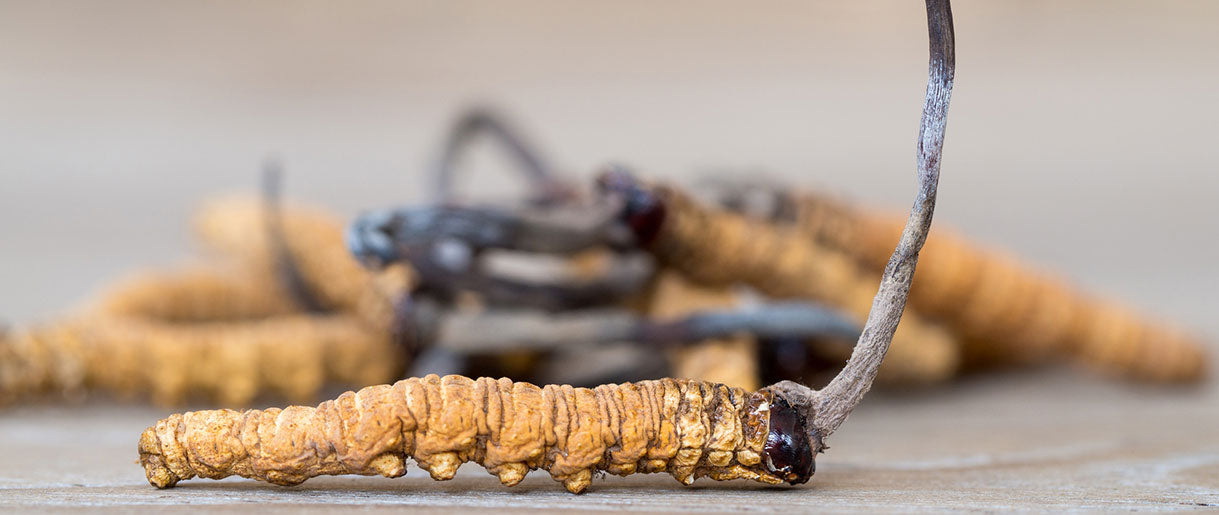

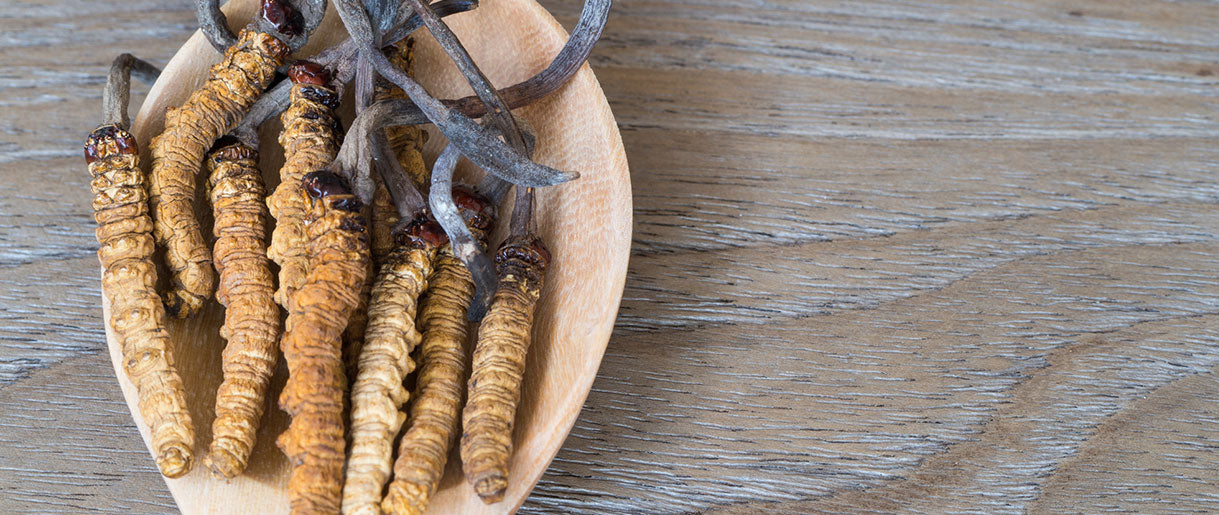



Let Us Know Your Comments